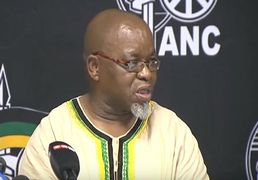SA’s freedom would only be complete when economic power was in black hands, President Jacob Zuma told the National House of Traditional Leaders on Thursday.
Mr Zuma returned to a familiar theme, saying it was land dispossession that caused the grinding poverty in black settlements and communities.
Diverting from his prepared text, Mr Zuma told the traditional leaders that they were not in control of the economy, meaning that SA’s freedom was not complete. He said he, unapologetically, felt very strongly about the land question and that more needed to be done to solve the problem.
Mr Zuma said during the debate of his address to the House last year that a lot of time was spent discussing the negative effects land dispossession has had on the lives of black people in SA.
"The dispossession of our land is the source of the poverty and inequality, which have become the ugly hallmark of our nation and an impediment to a future of shared prosperity," he said.
He again chided traditional leaders and urged them to join their efforts in claiming land —that was taken away — on behalf of the communities they lead, rather than lodging competing claims.
"I have been informed that some work in this regard has started, championed by the National House of Traditional Leaders.
"I strongly believe that access to land and security of land tenure are key to development, especially agricultural development. Land reform lies at the centre of government’s efforts to bring about inclusive economic development. It is at the centre of the NDP (National Development Plan)".
"I urge traditional leaders to thoughtfully and actively engage with the matter of land reform on behalf of the communities they lead. I am raising this as we can talk about agriculture and food security but without access to land, our people cannot plough and feed themselves or contribute to economic growth," Mr Zuma.
Referring to the severe drought, he said it had pushed most of SA’s farmers to the edge of financial ruin, but he again stopped short of declaring it a national disaster.
The government has come under increasing criticism for a slow response to the drought crisis but in his most detailed response to date, Mr Zuma unveiled what was being done both nationally and regionally.
"One of the domestic constraints to growth in our country currently is the severe drought. It threatens the livelihoods of our people and has pushed most of the farmers to the edge of financial ruin. Five provinces have declared a state of provincial drought disaster, namely, KwaZulu-Natal, the North West, the Free State, Limpopo and Mpumalanga.
"The situation is very difficult for many farmers. They have seen their livestock die, which has cost a lot of money. Food prices will go up because of the drought. You know this very well as many of these farms are in your areas," he told the assembled traditional leaders.
Mr Zuma said the government had created a drought-relief package that focused on the following:
• Identification of land for the relocation of livestock
• Revitalisation of feedlots
• Drilling and equipment of boreholes
• Auction sales of livestock
• Firebreaks creation, and
• Provision of feed and water for livestock.
Mr Zuma said a number of government departments were assisting in alleviating the effects of the drought. The primary focus currently is on funding for emergency or immediate needs.
"Interventions are sent to areas where existing water infrastructure is not functional due to drought and where there are no alternative means for water supply. Government is also assisting where water sources have dried up due to drought and communities do not have any alternative means for water supply," the President said.
"In addition to this, the Department of Agriculture, Forestry and Fisheries has reprioritised funds to provide livestock feed and water to affected farmers. The Department of Rural Development and Land Reform has reprioritised funds for livestock feed, livestock water, firebreaks, feedlots and auction sales.
"The Department of Water and Sanitation has reprioritised funds for the provision of water for human consumption," Mr Zuma said.
© BDlive 2016



























Change: -0.47%
Change: -0.57%
Change: -1.76%
Change: -0.34%
Change: 0.02%
Data supplied by Profile Data
Change: -1.49%
Change: 0.08%
Change: -0.47%
Change: 0.00%
Change: -0.04%
Data supplied by Profile Data
Change: -0.34%
Change: 0.03%
Change: -0.10%
Change: -0.22%
Change: -0.69%
Data supplied by Profile Data
Change: -0.28%
Change: -1.15%
Change: -0.07%
Change: -1.21%
Change: -0.22%
Data supplied by Profile Data